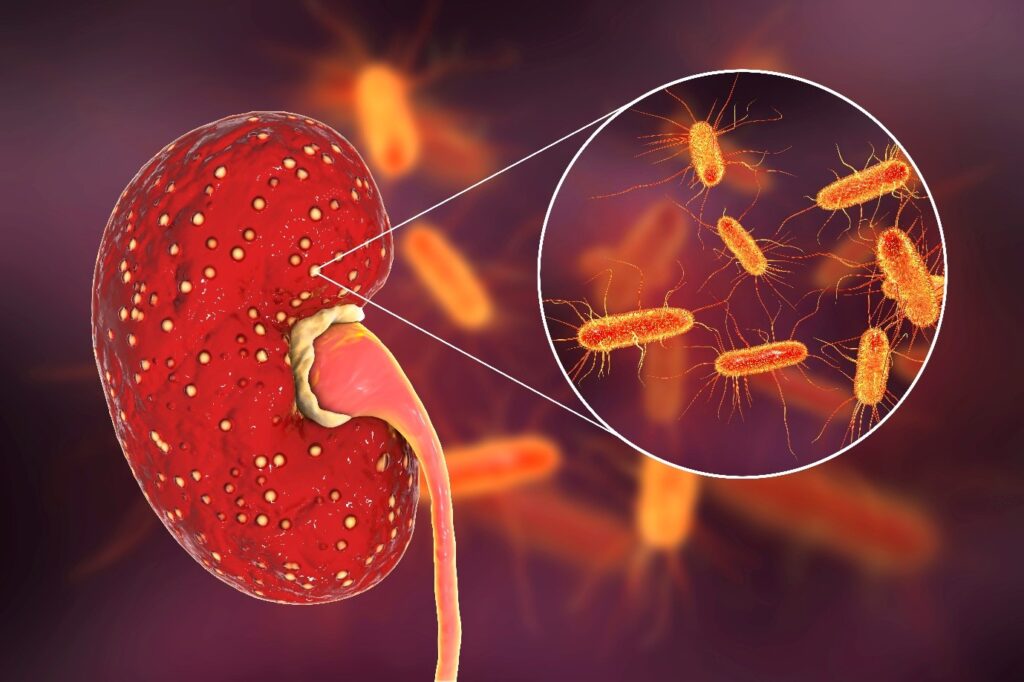What is Pyelonephritis?
Pyelonephritis is a bacterial infection of the kidneys. It is primarily caused by bacteria that travel up the urinary tract to the kidneys, resulting in inflammation and swelling.
The condition can present in two forms:
- Acute Pyelonephritis: This is a sudden and severe kidney infection that typically causes swelling in the kidneys. If left untreated, it can lead to permanent kidney damage and can even be life-threatening in some cases.
- Chronic Pyelonephritis: This form of the condition occurs when the infection persists or recurs over a long period. It is relatively rare but can develop in children or people who have urinary tract obstructions. Chronic pyelonephritis can lead to long-term kidney damage, including scarring or decreased kidney function.
Both acute and chronic pyelonephritis require timely diagnosis and treatment to avoid severe complications, such as kidney failure or sepsis.
What are the Symptoms of Pyelonephritis?
The symptoms of pyelonephritis vary depending on whether the condition is acute or chronic, but common signs of infection usually appear within two days after the bacteria enter the kidneys.
Early detection is key to preventing long-term damage to the kidneys, and if you experience the following symptoms, it is important to visit your doctor immediately:
Acute Pyelonephritis Symptoms:
- High fever: A fever greater than 102°F (38.9°C) is often the first sign of infection.
- Pain in the abdomen, back, or side: You may experience a sharp or dull pain in the lower abdomen, side, or even the groin area.
- Painful or burning urination: A common symptom that occurs as the infection affects the urinary tract.
- Cloudy or foul-smelling urine: The presence of bacteria and pus in the urine can cause it to appear cloudy or have a strong odor.
- Frequent or urgent urination: You may feel the constant urge to urinate, even if only small amounts of urine are passed.
Other symptoms of acute pyelonephritis can include:
- Shaking chills
- Nausea and vomiting
- Fatigue and general feeling of illness
- Mental confusion (especially in older adults)
- Moist or sweaty skin
Chronic Pyelonephritis Symptoms:
In chronic cases, the symptoms may be less severe or even absent. However, some individuals may experience mild discomfort or recurrent urinary tract infection (UTI) symptoms. Chronic pyelonephritis is often characterized by persistent or recurrent kidney infections that can cause kidney scarring and reduced kidney function over time.
It’s important to note that symptoms may differ depending on the age of the patient. For example, older adults may experience mental confusion as a primary symptom, while children or younger adults might experience the typical fever, pain, and urinary symptoms.
If you notice any unusual changes in your urinary habits, or if symptoms of infection persist, seek medical advice for an evaluation. Early intervention can prevent the infection from worsening.
What are the Causes and Risk Factors?
The majority of pyelonephritis cases begin with a urinary tract infection (UTI) that starts in the bladder.
Bacteria, most commonly Escherichia coli (E. coli), travel from the urethra into the bladder and then ascend through the ureters to infect the kidneys. In more severe cases, infections can spread through the bloodstream and affect the kidneys directly.
Risk Factors for Acute Pyelonephritis:
Various factors can increase the risk of developing pyelonephritis. These include:
- Urinary Tract Obstruction: Conditions such as enlarged prostate, or kidney stones, anatomical anomalies can block the normal flow of urine, which can increase the risk of kidney infection.
- Gender: Women are at a higher risk due to their shorter urethras, which make it easier for bacteria to reach the bladder and kidneys.
- Weakened Immune System: People with weakened immune systems due to conditions like diabetes, HIV/AIDS, cancer, or those taking immunosuppressive medications are more vulnerable to infections.
- Pregnancy: Changes in the urinary tract during pregnancy can increase the chance of pyelonephritis, as the growing uterus puts pressure on the ureters and bladder.
- Older Adults: Older individuals may have an increased risk of developing pyelonephritis, and symptoms can be less obvious, often manifesting as confusion or other subtle signs.
- Other Risk Factors: People who use urinary catheters, have recently had urinary tract surgery, or experience nerve or spinal cord damage may be at increased risk of developing infections that lead to pyelonephritis.
If you have any of these risk factors, regular screenings and preventive care are vital in reducing your risk.
How is Pyelonephritis diagnosed?
If your doctor suspects that you have pyelonephritis, they will typically begin with a physical exam and a review of your symptoms. Many diagnostic tests can help confirm the diagnosis:
Urine Tests:
Urine tests are the first step in diagnosing pyelonephritis. A urine culture will help identify the bacteria causing the infection, allowing doctors to prescribe the most effective antibiotic. The presence of white blood cells, red blood cells, or pus in the urine also indicates a kidney infection.
Imaging Tests:
If the infection is severe or if there is suspicion of urinary tract obstructions, your doctor may recommend imaging studies:
- Ultrasound: A non-invasive procedure that can detect kidney abnormalities such as cysts, abscesses, or obstructions.
- CT Scan: A CT scan is used to get a detailed view of the kidneys and urinary tract. It can help identify complications like abscesses or stone obstructions that might be causing the infection.
Radioactive Imaging:
For recurrent pyelonephritis, doctors may advice a dimercaptosuccinic acid (DMSA) scan to identify kidney scarring. During this test, a radioactive substance is injected, which is absorbed by the kidneys, allowing damaged areas to be detected. Early diagnosis with these tests is vital for prompt treatment and preventing long-term complications.
How is Pyelonephritis Treated?
The treatment typically focuses on eliminating the bacterial infection through the use of antibiotics. The choice of antibiotics will depend on the bacteria involved.
In most cases, symptoms improve within 2 to 3 days of starting antibiotic treatment.
However, it is important to complete the entire prescribed course of antibiotics (usually 10 to 14 days) to ensure the infection is fully cleared.
Hospitalization and Intravenous Antibiotics:
In severe cases, intravenous antibiotics and fluids may be administered in the hospital. This is particularly true if the patient cannot take oral antibiotics, is severely ill, or if the infection is not responding to oral treatment. Hospital stays typically last 24 to 48 hours, and after being discharged, patients will be prescribed oral antibiotics for continued treatment.
Surgery:
In some cases, surgery may be needed to remove kidney obstructions, drain abscesses, or correct anatomical issues contributing to recurrent infections. If the infection has caused extensive damage to the kidneys, a nephrectomy (surgical removal of part of the kidney) may be required.
Pyelonephritis in Pregnant Women:
Pregnant women are more susceptible to pyelonephritis, requiring careful management. Treatment generally includes intravenous antibiotics, and hospitalization may be necessary for monitoring.
Preventing Pyelonephritis
Prevention is essential to avoid kidney infections and reduce the risk of complications. Some key steps include:
- Hydration: Consuming plenty of fluids helps flush bacteria from the urinary tract.
- Post-Sexual Activity Hygiene: Urinate after sex to help clear bacteria from the urinary tract.
- Proper Hygiene: Always wipe from front to back to avoid transferring bacteria to the urethra.
- Avoid Irritants: Stay away from douches, sprays, and scented hygiene products that can irritate the urinary tract.
- Regular Checkups: People with a history of UTIs or risk factors for pyelonephritis should have regular medical exams to detect infections early.
Conclusion
Pyelonephritis is a serious infection that requires timely medical attention. By recognizing the symptoms, understanding the causes and risk factors, and seeking immediate treatment, you can protect your kidneys and ensure a full recovery. Let Prabhat Memorial Hospital help you take charge of your health and well-being.




